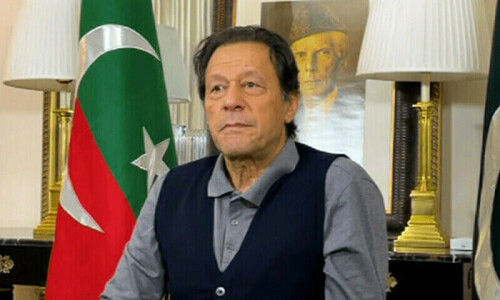• Inflation expected to remain 17pc to 19pc this fiscal
• June CPI recorded at 21.3pc, compared to May’s 13.8pc
• Transport index sees biggest increase of 62.2pc, followed by 25.9pc in food
ISLAMABAD: Monthly inflation surged to 21.3 per cent in June, its highest pace in over 13 years, mainly fuelled by rising petroleum product prices.
The spike comes as fuel prices have skyrocketed by around 90pc since the last week of May after the new coalition government scrapped costly fuel subsidies in an attempt to tame a surging fiscal deficit and revive a stalled International Monetary Fund (IMF) loan programme.
It was a sharp increase in the headline inflation — measured through the Consumer Price Index (CPI) — from 13.8pc in May 2022 and 9.7pc in June 2021, according to data released by the Pakistan Bureau of Statistics.
The last time prices accelerated so fast was in December 2008, when the CPI was recorded at 23.3pc. The index has since mostly remained below 15pc with a few exceptions.
The high June figure has also taken the monthly average inflation to 12.15pc in the outgoing fiscal year compared to 8.9pc and 10.74pc in the previous years.
On a year-on-year basis, the transport index saw the biggest rise of 62.2pc in June followed by food (25.9pc) and restaurants and hotels (21.9pc) categories.
The country has been struggling with high inflation for the last few months. Despite rising global oil prices, former prime minister Imran Khan adopted fuel and power subsidies in March as he faced mounting discontent over his handling of the economy and rising inflation.
Mr Khan was ousted in April through a vote of no confidence in parliament, and the new government began reversing the costly subsidy, which it brought on a par with global prices late last month.
The current government has introduced a series of fuel price hikes since May 26, with the latest increase of up to Rs19 per litre on Thursday as it unleashed a petroleum levy in its battle to reduce the fiscal deficit.
The levy, which is expected to rise even further, was part of fiscal consolidation measures agreed with the IMF to resume the bailout programme.
A research report by Topline Securities expects inflation to remain around 17pc to 19pc in the just-started fiscal year. The report also expects a policy rate hike by the State Bank of Pakistan (SBP) in a meeting scheduled for next week. The central bank has already raised the rate by 400 basis points this year.
Apart from CPI, other inflationary indicators like the Sensitive Price Indicator (SPI) and the Wholesale Price Index (WPI) also saw substantial spikes in June.
The SPI rose to 21.7pc in June from 14.1pc a month earlier and 17.6pc in the same month last year. The WPI surged to 38.9pc in June compared to 29.6pc in the previous month and 20.9pc a year ago.
‘God help Pakistan’
Reacting to June Inflation figures, former finance minister Shaukat Tareen tweeted: “We had warned that political instability will destabilise the economy which was growing the fastest in 17 years and on all pistons. It was not to be and [Mr Khan’s] government was sent packing. Now see the results. SBP has also raised the discount rate by 2.5pc today. Allah help Pakistan.”
In addition to a rise in fuel prices, a weakening rupee has also led to an import-led inflation in the country, which is expected to escalate further if no corrective measures are taken.
At the same time, a crisis is still looming for the edible oil sector, as Indonesia, the biggest exporter of palm oil, has suspended supplies due to local shortages, leading to an increase in prices of vegetable ghee and cooking oil in Pakistan.
Official data showed that food inflation remained on the higher side in June, as it shot up to 24pc year-on-year and 5pc month-on-month in urban areas, whereas the respective growth in prices in rural areas was 27pc and 6pc — a reversal of the trend where urban areas usually experience higher food prices.
At the same time, prices of ghee, cooking oil, meat, fruit and vegetables also registered a persistent increase in major urban and rural centres and traders took undue advantage of an ineffective price regulatory system.
Non-food inflation in urban centres increased to 17.3pc year-on-year and 6.8pc month-on-month, whereas in rural areas it rose to 20.4pc and 7.1pc, respectively. The increase in non-food inflation was mainly driven by unprecedented rising oil prices.
Food items whose prices rose in June compared to the previous month included potatoes 34.64pc, eggs 19.98pc, pulse masoor 17.42pc, custard oil 17.39pc, pulse gram 14.03pc, gram whole 13.62pc, wheat 13.03pc, vegetable ghee 12.86pc, rice 11.67pc, besan 9.36pc, tomatoes 9.03pc, milk 8.18pc, cooking oil 7.91pc and fruits 7.69pc.
A similar trend was noticed in the prices of essential food and non-food items in the rural areas.
In urban areas, however, the prices of chicken dropped 7.83pc, wheat flour 3.76pc and vegetables 3.54pc.
The core inflation in urban areas was 11.5pc in June against 9.7pc the previous month. In rural areas, the increase was 13.6pc against 11.5pc. This shows that the increase in interest rates also could not stop the upward trend in core inflation.
At the same time, non-food items whose rates increased in June compared to the previous month included electricity charges 51.80pc, motor fuel 37.13pc, footwear 8.82pc, stationery 8.29pc, construction input items 5.26pc, motor vehicle accessories 4.4pc, plastic products 3.87pc, washing soap/detergents/matchbox 3.80pc each and carpets 3.03pc.
Published in Dawn, July 2nd, 2022














































Dear visitor, the comments section is undergoing an overhaul and will return soon.